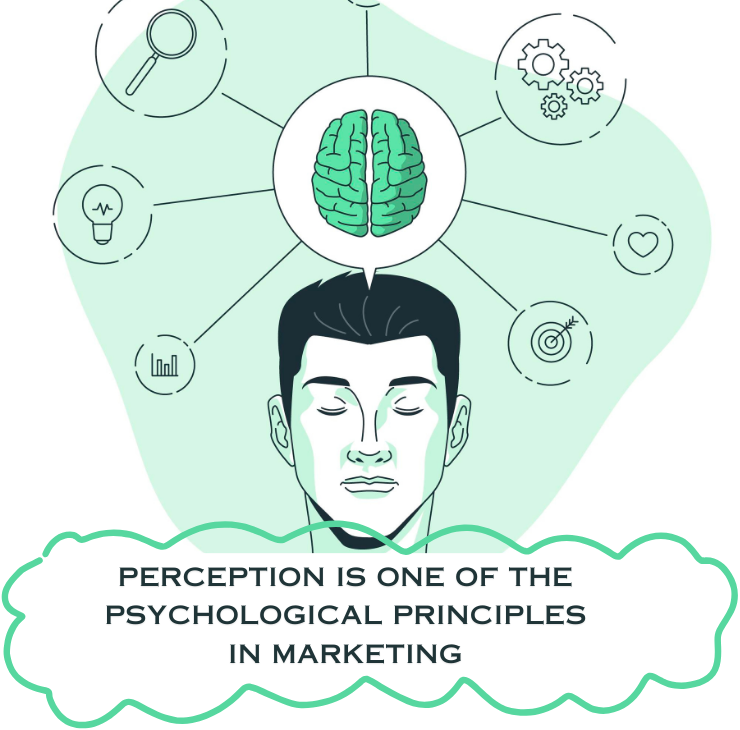Marketing is both an art and a science, and one of its basic pillars is understanding human psychology. In fact, marketers leverage psychological principles in marketing by influencing purchasing decisions, building brand loyalty, and driving business growth. In addition, successful marketers understand how consumers think, feel, and act, allowing them to craft compelling campaigns that resonate with their target audience. This article explores several psychological principles in marketing that underpin effective marketing strategies, and highlights how these principles can be leveraged to connect with consumers.
Perception is one of the psychological principles in marketing

The perception in marketing is considered to be the lens through which consumers interpret and interact with brands and products. Marketers are known to strategically use various elements such as product packaging, branding and visual design to influence consumer perception. Take the same color science, for example, where different colors lead to distinct emotions and associations. Red is a symbol of energy and passion, while blue is a symbol of trust and reliability. By carefully incorporating these colors into branding and packaging, marketers can evoke specific emotions and shape consumers’ perceptions to match their brand identity and goals.
In addition, marketers benefit from the influence of perception to influence consumer perceptions and preferences. Of course, marketers can influence consumers in how they perceive value and desire by providing product benefits in a positive light or by comparing them positively with competitors. For example, depicting the product as “90% free of fat” instead of “10% fat” emphasizes its health, which particularly attracts consumers interested in health. Through the deliberate manipulation of visual and verbal signals, marketers formulate perceptions that correspond to the messages and objectives of their brand, thus promoting positive consumer attitudes and behaviour.
“Also read: The Future of Digital Marketing”
Harnessing emotional connections
Emotions are at the heart of Psychological Principles in Marketing and often trump rational considerations. Recognizing this, marketers are crafting emotionally resonant messages and experiences to create deep connections with consumers. The importance of emotional branding lies in establishing meaningful connections between the brand and specific feelings or values. For example: Coca-Cola’s holiday campaigns, which evoke feelings of warmth and togetherness, making the brand synonymous with joy and celebration.
Furthermore, emotional storytelling amplifies the connection between consumers and a brand, allowing brands to engage consumers on a deeper level by tapping into universal emotions and themes. In addition, crafting narratives that resonate with consumers’ aspirations or fears creates lasting impressions that lead to brand affinity and loyalty.
Cognitive biases and decision making is one of Psychological Principles in Marketing

The human decision-making process is full of cognitive biases that influence choices in often unpredictable ways. Marketers take advantage of these biases to effectively predict and shape consumer behavior. For example, anchoring bias leads individuals to rely heavily on primary information when making decisions.
Another prevalent bias is the scarcity heuristic, where people assign a higher value to rare or limited items. Marketers exploit this by creating a sense of urgency through limited-time offers or exclusive promotions. Highlighting a product’s scarcity or emphasizing its limited availability increases consumers’ fear of missing out, prompting them to take immediate action. However, it is essential that marketers use scarcity tactics transparently and ethically to maintain consumer trust and credibility over time.
Leverage social proof

Social proof is a powerful psychological phenomenon and one of the most important psychological principles in marketing that shapes consumer behavior through the actions and behaviors of others. Marketers leverage social proof through testimonials, reviews, and endorsements to instill confidence in potential buyers. Notably, social influence within communities and social networks amplifies this influence further, as peer recommendations and user-generated content contribute to a brand’s perceived value and appeal.
Moreover, online platforms play a pivotal role in expanding social proof, as user reviews and ratings greatly influence purchasing decisions. Brands can benefit from the influence of social networks, by fostering a sense of community and encouraging user engagement. Marketers constantly seek and offer customer feedback to enhance credibility and trustworthiness.
The principle of scarcity in business is one of the psychological principles in marketing
The scarcity principle takes advantage of consumers’ tendency toward items that are perceived as rare or exclusive. Marketers use scarcity tactics such as limited-time offers or exclusive promotions to create a sense of urgency and drive purchasing behavior. By emphasizing a product’s scarcity or highlighting its limited availability, marketers exploit consumers’ fear of missing out, prompting them to take immediate action. However, ethical considerations are of paramount importance to maintaining consumer trust and credibility. Marketers must ensure true scarcity and transparent communication to avoid the erosion of trust and credibility over time.
In conclusion, understanding and utilizing psychological principles in marketing is crucial to effective marketing strategies. From shaping perceptions and establishing emotional connections to influencing decision-making and leveraging social evidence, psychological insights provide invaluable guidance to marketers. By incorporating these principles into their strategies, companies can create compelling campaigns and experiences that resonate with consumers, driving brand loyalty and business growth in today’s competitive landscape.
FAQ
1. How can marketers integrate psychology into digital marketing efforts?
Marketers can leverage psychological principles in digital marketing by personalizing messaging, optimizing website design for emotional appeal, and showcasing social proof through user-generated content. Understanding consumer behavior online allows marketers to create more effective digital campaigns that resonate with their target audience.
2. What ethical considerations should marketers keep in mind when applying psychological tactics?
Marketers must prioritize consumer well-being, avoid manipulation, and ensure transparency in their marketing efforts. Ethical conduct fosters trust and credibility with consumers, ultimately enhancing brand reputation and loyalty.
3. How can small businesses with limited resources leverage psychological principles in marketing?
Small businesses can focus on understanding their target audience, crafting authentic messaging, and fostering community engagement through social media. Leveraging psychological insights allows small businesses to create impactful marketing campaigns that resonate with their audience, driving engagement and growth.





